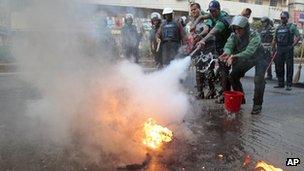Bangladesh war crimes judge Nizamul Huq resigns
- Published

The Jamaat-e-Islami has regularly protested for the release of its leaders and for the trial to be halted
The presiding judge of a special tribunal looking into alleged crimes against humanity during Bangladesh's independence war in 1971 has resigned citing "personal reasons".
The resignation of Nizamul Huq came days after his private emails and Skype conversations were leaked to the media.
They appear to show Mr Huq discussing the working of the tribunal with an overseas Bangladeshi legal expert.
Legal experts say it was improper for a judge to discuss a case with outsiders.
But the government argues that the judge was not acting improperly.
In an article published last week, the London-based Economist said it had obtained 17 hours of recorded telephone conversations and seen more than 230 emails between Mr Huq and Belgian-based Bangladeshi lawyer Ahmed Ziaduddin.
"These emails, if genuine, would indeed raise questions about the working of the court and we are bound to investigate them as fully as we can," the publication said.
Genocide
It is still not clear how the conversations and emails of the judge were collated - and who passed them on to the media.
"We did not solicit the material, not pay for it, nor commit ourselves to publish it," the Economist said.
"This material is confidential and we are bound by law and the British press's code of conduct not to reveal such information except in matters of the most serious public interest."
The government for its part has accepted the resignation - arguing that it was necessary in the interests of transparency and neutrality - while simultaneously stressing that Mr Haq had in no way behaved improperly.
"He [Mr Huq] has not divulged anything concerning the deposition, facts or anything which is before the court," Law Minister Shafique Ahmed told the BBC.
"He wanted to have some information on procedural law, which anybody can have from an expert."
Mr Ahmed said that the resignation would not in any way affect the fairness of the trial.
The special court was set up by the government in 2010 to prosecute people accused of committing crimes against humanity in 1971. Its first verdict is expected any day.
Entirely a domestic body, the tribunal is trying nine leaders from the Jamaat-e-Islami party - the largest Islamist party in the country - and two people from the main opposition Bangladesh Nationalist Party.
The nine leaders are accused of various charges including genocide, rape, murder and forceful religious conversions.
The two opposition parties say the charges are politically motivated. They have described the proceedings as a show trial.
International human rights groups have urged the government to ensure the trials are carried out in accordance with international standards.
The Jamaat-e-Islami has held protests for the last few months demanding the release of its leaders and for the trial to be halted.
Barrister Abdur Razaak, the chief defence counsel at the tribunal, has demanded a retrial following the resignation.
"We are happy with that [the resignation]. But the entire process is vitiated because of so many irregularities," he said.
- Published4 December 2012
- Published28 May 2012
- Published20 November 2011